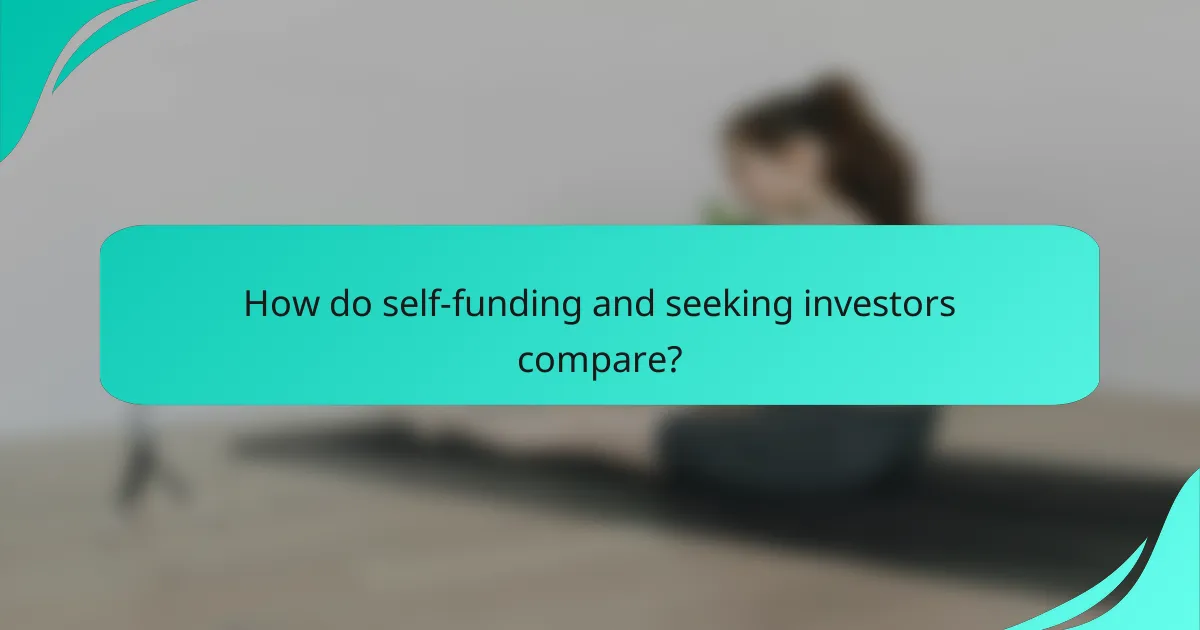When starting a business, entrepreneurs often face the critical decision of self-funding or seeking investors. Self-funding, or bootstrapping, allows for greater control and independence, while seeking investors can provide essential capital and expertise for rapid growth. Understanding the advantages and disadvantages of each approach is crucial for aligning financing strategies with business goals and risk tolerance.

What are the advantages of self-funding?
Self-funding, or bootstrapping, allows entrepreneurs to finance their business using personal savings or revenue generated from operations. This approach offers several key benefits that can significantly impact the growth and direction of a company.
Complete control over business decisions
When you self-fund your business, you maintain full control over all decisions. This autonomy enables you to implement your vision without needing to compromise with external investors. You can pivot your strategy quickly based on market feedback without waiting for approvals.
For instance, if you want to change your product line or marketing approach, you can do so immediately, ensuring that your business remains agile and responsive to customer needs.
No dilution of ownership
Self-funding means you retain 100% ownership of your business, avoiding dilution that often comes with seeking outside investors. This is particularly beneficial for entrepreneurs who want to maintain their original vision and direction.
By keeping full ownership, you also reap all the financial rewards. As your business grows, you won’t have to share profits with investors, allowing for greater financial independence and long-term wealth accumulation.
Faster decision-making process
Self-funding leads to a streamlined decision-making process. Without the need to consult investors or board members, you can make choices quickly, which is crucial in fast-paced markets. This speed can give you a competitive edge over businesses that rely on external funding.
For example, if an opportunity arises to enter a new market or launch a product, you can act immediately, capitalizing on trends before they become saturated.
Retained profits for reinvestment
When you self-fund, you can reinvest profits back into the business without external obligations. This allows for strategic growth, such as expanding product lines or enhancing marketing efforts, using funds generated from your own operations.
Reinvesting profits can lead to compounding growth over time, as you can continuously improve and scale your business based on its own success rather than relying on external capital.

When should you seek investors?
You should seek investors when your business requires significant capital for rapid growth, specialized knowledge, or to enhance its credibility in the market. This approach can provide the necessary resources and support to scale effectively and establish a strong presence.
Need for rapid scaling
If your business model demands quick expansion, seeking investors can provide the funds needed to accelerate growth. This is particularly relevant in competitive markets where speed can be a decisive factor in capturing market share.
Consider scenarios where you need to launch new products, enter new markets, or increase production capacity quickly. In such cases, securing investment can allow you to scale operations faster than relying solely on self-funding.
Access to industry expertise
Investors often bring valuable industry experience and connections that can benefit your business. Their insights can guide strategic decisions, helping you navigate challenges more effectively.
When seeking investors, look for those with a track record in your industry. Their expertise can complement your vision and enhance your business strategy, making it easier to achieve your goals.
Enhanced credibility with stakeholders
Having investors can significantly boost your business’s credibility with customers, suppliers, and other stakeholders. It signals that your venture has been vetted and is considered a viable opportunity by knowledgeable individuals.
When presenting your business to potential partners or clients, mentioning reputable investors can instill confidence and open doors that may otherwise remain closed. This can be especially beneficial in industries where trust and reputation are paramount.

How do self-funding and seeking investors compare?
Self-funding and seeking investors are two distinct approaches to financing a business, each with its own advantages and disadvantages. Choosing between them depends on factors like the business’s stage, growth ambitions, and risk tolerance.
Cost implications of each approach
Self-funding, often referred to as bootstrapping, typically involves using personal savings or revenue generated from the business. This method can minimize costs related to equity dilution but may limit the amount of capital available for growth. In contrast, seeking investors usually requires giving up a portion of ownership, which can be costly in the long run if the business scales significantly.
When evaluating costs, consider that self-funding may lead to lower initial expenses but could restrict access to larger sums needed for rapid expansion. Investors can provide substantial capital upfront, but they often expect a return on their investment, which can impact future profits.
Impact on business growth trajectory
Self-funding can lead to a slower growth trajectory since the business relies on limited resources. This approach often fosters a more sustainable growth model, allowing for careful scaling without external pressures. However, it may hinder the ability to seize market opportunities quickly.
On the other hand, seeking investors can accelerate growth by providing immediate access to larger sums of capital. This can facilitate rapid expansion, marketing efforts, and product development. However, it may also introduce pressure to achieve quick returns, potentially leading to decisions that prioritize short-term gains over long-term stability.
Risk factors associated with each method
Self-funding carries the risk of personal financial loss, as entrepreneurs invest their own savings. If the business fails, they may face significant financial strain. Additionally, limited funding can restrict growth, making it challenging to compete against better-funded rivals.
Seeking investors involves its own risks, including loss of control over business decisions and the pressure to meet investor expectations. Entrepreneurs must also navigate the complexities of investor relationships, which can lead to conflicts if visions for the business diverge. Balancing these risks is crucial when deciding on a funding approach.

What are the key considerations for choosing a funding method?
Choosing a funding method involves evaluating various factors, including your business stage, market conditions, and personal financial situation. Each funding option, whether self-funding or seeking investors, has distinct advantages and challenges that can significantly impact your business trajectory.
Business stage and goals
Your business stage plays a crucial role in determining the appropriate funding method. Startups often rely on self-funding to maintain control and avoid early dilution of equity, while more established businesses may seek investors to accelerate growth or expand operations.
Consider your long-term goals as well. If your aim is rapid scaling, external funding might provide the necessary capital. Conversely, if you prioritize sustainability and gradual growth, self-funding could be more suitable.
Market conditions and competition
Market conditions can influence your funding choice significantly. In a competitive landscape, securing investor backing may provide the resources needed to differentiate your business quickly. However, in a stable or slow-growth market, self-funding might suffice to navigate challenges without the pressure of investor expectations.
Assessing the current economic climate is essential. For instance, during economic downturns, investors may be more cautious, making self-funding a more viable option for maintaining control over your business.
Personal financial situation
Your personal financial situation is a critical factor in deciding between self-funding and seeking investors. If you have sufficient savings or assets, self-funding can allow you to retain full ownership and control over your business decisions.
However, if your personal finances are tight, relying on investors may alleviate financial pressure while providing additional expertise and resources. Weigh the risks of personal investment against the potential benefits of bringing in external capital.

What are the potential risks of self-funding?
Self-funding can lead to several risks that entrepreneurs should consider before committing their personal finances. These risks include financial strain on personal resources, limited growth potential, and increased pressure on the founder.
Financial strain on personal resources
Self-funding often requires significant personal investment, which can lead to financial strain. Entrepreneurs may deplete savings or take on debt, impacting their personal financial stability. This strain can become particularly acute if the business does not generate immediate returns.
To mitigate this risk, founders should establish a clear budget and timeline for their self-funding efforts. Setting limits on how much personal capital to invest can help protect against excessive financial exposure.
Limited growth potential
When relying solely on personal funds, businesses may face limited growth potential due to restricted financial resources. Without external investment, scaling operations, hiring talent, or expanding marketing efforts can be challenging. This limitation can hinder the business’s ability to compete effectively in the market.
Entrepreneurs should assess their growth goals and consider whether self-funding can realistically support those ambitions. Exploring alternative funding options, even on a small scale, may provide the necessary capital to unlock growth opportunities.
Increased pressure on the founder
Self-funding places significant pressure on the founder, as their personal finances are directly tied to the business’s success. This pressure can lead to stress and burnout, affecting decision-making and overall performance. The emotional burden of risking personal assets can also impact relationships and personal well-being.
To manage this pressure, founders should seek support networks, such as mentorship or peer groups, to share experiences and strategies. Establishing a work-life balance and setting realistic expectations can also help alleviate some of the stress associated with self-funding.
